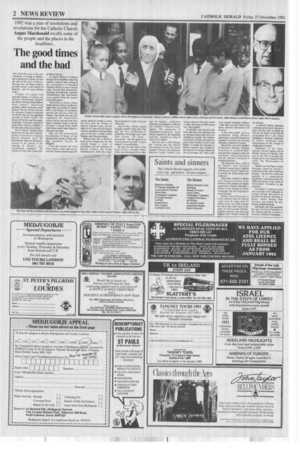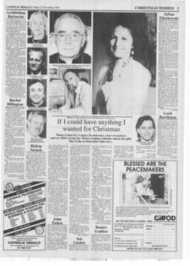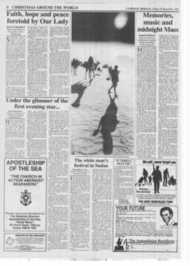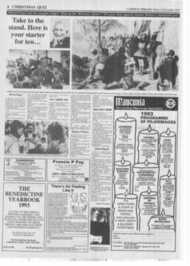Page 2, 25th December 1992
Page 2

Report an error
Noticed an error on this page?If you've noticed an error in this article please click here to report it.
Tags
Share
Related articles
Malawi Votes For Democracy As Bishops 'postpone' Feast
The Exile Of Britain's Marginalised Bishop
Catechism 'will Add To
Bishops In Malawi Not Arrested
Revolution Sparked By A Pastoral Letter
1992 was a year of resolutions and revelations for the
Catholic Church. Angus Macdonald recalls some of the people and the places in the headlines...
The good times and the bad
1992 WAS the year of the new Catechism, of courage in Malawi, and of generosity at home, but also the year of the crisis in BosniaHerzegovina, the Pope's illness, possible schism in the Church of England and, of course, Bishop Casey.
It began, as it ended, with episcopal changes. In January, the diocese of Westminster mourned the death of Bishop Gerald Mahon, West London's much-loved auxiliary, whilst in the same month Bishop Vincent Nichols became the youngest bishop in England and Wales when he was appointed auxiliary in North London. The diocese of Hexham and Newcastle, meanwhile, welcomed Ampleforth monk Dom Ambrose Griffiths at his episcopal ordination in March.
Also in March, Cardinal Basil Hume became the first Catholic prelate to preach to a reigning British monarch since the Reformation when he delivered a sermon to the Queen at the opening of Britain's new "ecumenical cathedral", the Church of Christ the Cornerstone in Milton Keynes.
In April, Malawi's Catholic bishops hit the headlines when they drafted a pastoral letter calling on the government of President Hastings Banda to respect human rights. Several Irish missionaries, including the Irish-born Apostolic Administrator, Mgr John Roche, were expelled from the country amid death threats.
Meanwhile at home a hardfought general election resulted in a higher than ever number of Catholic MPs in the House of Commons, and the fall and rise of the two Patten: Chris Patten, the man who engineered the Conservative victory, lost his seat and went on to begin a turbulent tenure as the last Governor of Hong Kong, whilst John Patten finally made cabinet as Education Secretary.
May saw the controversial beatification in Rome of the Spanish-born founder of Opus Dei, Mgr Josemaria Escriva de Balaguer.
Later that month, the Irish Times broke a story that was to rock the Church and preoccupy the secular media for months to come: the news that the Bishop of Galway, Eamonn Casey, was the father of a 17-year-old son living in America, and that he had paid large sums to the boy's mother, Annie Murphy, out of diocesan funds.
Bishop Casey flew to Rome to hand in his resignation, but the scandal began a wave of speculation over the questions of priestly celibacy and sexual misdemeanours within the clergy that resonated for much of the rest of the year.
Also in May, a Rome summit brought together Pope John Paul and the new Archbishop of Canterbury, Dr George Carey. John
Paul warned Dr Carey presciently that the question of women priests was still "a grave obstacle" to reconciliation.
By June, the true extent of the crisis facing a drought-ridden Africa was becoming all too clear and the bishops' conference authorised an emergency collection for CAFOD's "Food for Life" appeal. The generosity of churchgoers nationwide many already squeezed by the deepening recession resulted in a total of well over £1 million.
June also saw a clash between the Vatican and the British Government at the Rio Earth Summit. Overseas Development Minister Lynda Chalker told Vatican observers that their refusal to allow discussion of birth control was "short-sighted".
In mid-July came the news that Pope John Paul was suffering front an intestinal tumour and was to be admitted to hospital. The Catholic world held its breath and prayed as good wishes flooded in from world leaders. A trouble-free operation in Rome's Gemelli clinic resulted in the removal of a benign tumour the size of an orange, and after a spell
at his summer mountain residence John Paul was soon back at his duties. Doctors forecasted a full recovery.
In the same month, our own Archbishop Derek Worlock underwent a successful three-hour operation to remove his left lung following a diagnosis of cancer.
Meanwhile, one of the founders of Liberation Theology. Brazilian Franciscan Fr Leonardo Boff, announced his resignation from the priesthood, citing exasperation with the Vatican's "boxing-in of intelligent theology".
The following week, a leak of the Church's new Universal Catechism stunned many Catholics with the news that the Church was to sanction the death penalty, later confirmed.
Meanwhile, Catholics in Britain were overjoyed to learn of the election of the popular and highly respected Fr Timothy Radcliffe as Master of the Dominican Order worldwide, the first Englishman ever in the post.
Bishop David Konstant of Leeds admitted that his diocese could soon be more than £2 million in the red, whilst towards the end of July came news of the death of Lord Leonard Cheshire, Catholic convert, war hero and founder of the Cheshire Homes for
the disabled.
A national Catholic education conference at the end of July got to grips with the issue of opting out and saw the launch of the new RE programme Here I Am, whilst September's National Conference of Priests witnessed warm endorsement for the concept of collaborative ministry.
Highlight of the week, however, was the surprise visit of Mother Teresa of Calcutta, who was in the UK to arrange the setting up of a new branch of her order, the Missionaries of Charity.
October saw the Pope in Santo Domingo, where he oversaw a gathering of the Latin American bishops but did not oversee the opening of a controversial lighthouse commemorating the 500th anniversary of the arrival of Christopher Columbus in tb. Americas.
November's Anglican synod vote in favour of the ordination of women brought speculation of disaffected priests flocking to Rome, whilst Bishop John Crowley was named the new Bishop of Middlesbrough.
And finally, the Pope presented the new Universal Catechism to the Church and the world at a ceremony in Rome in December.
blog comments powered by Disqus











